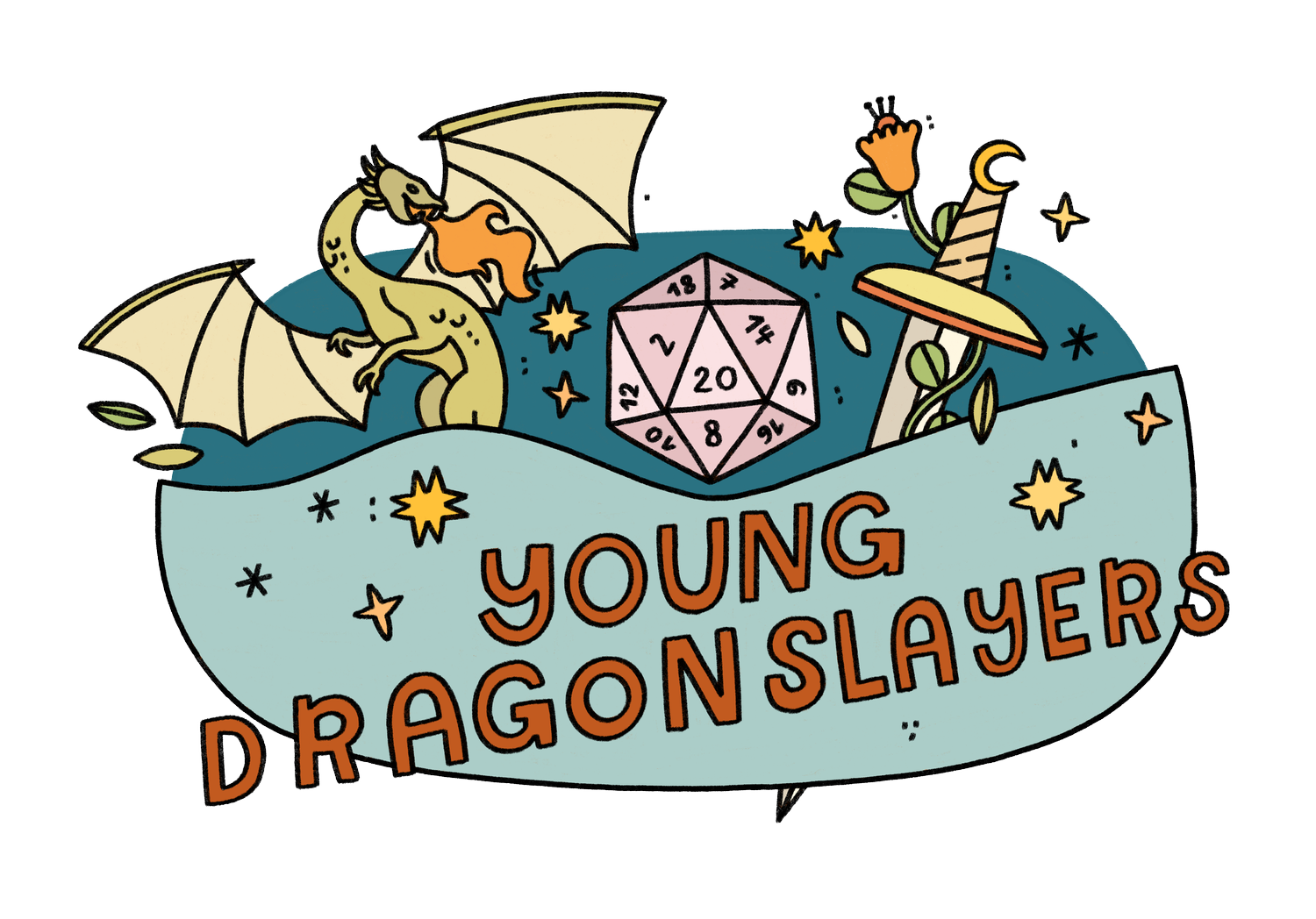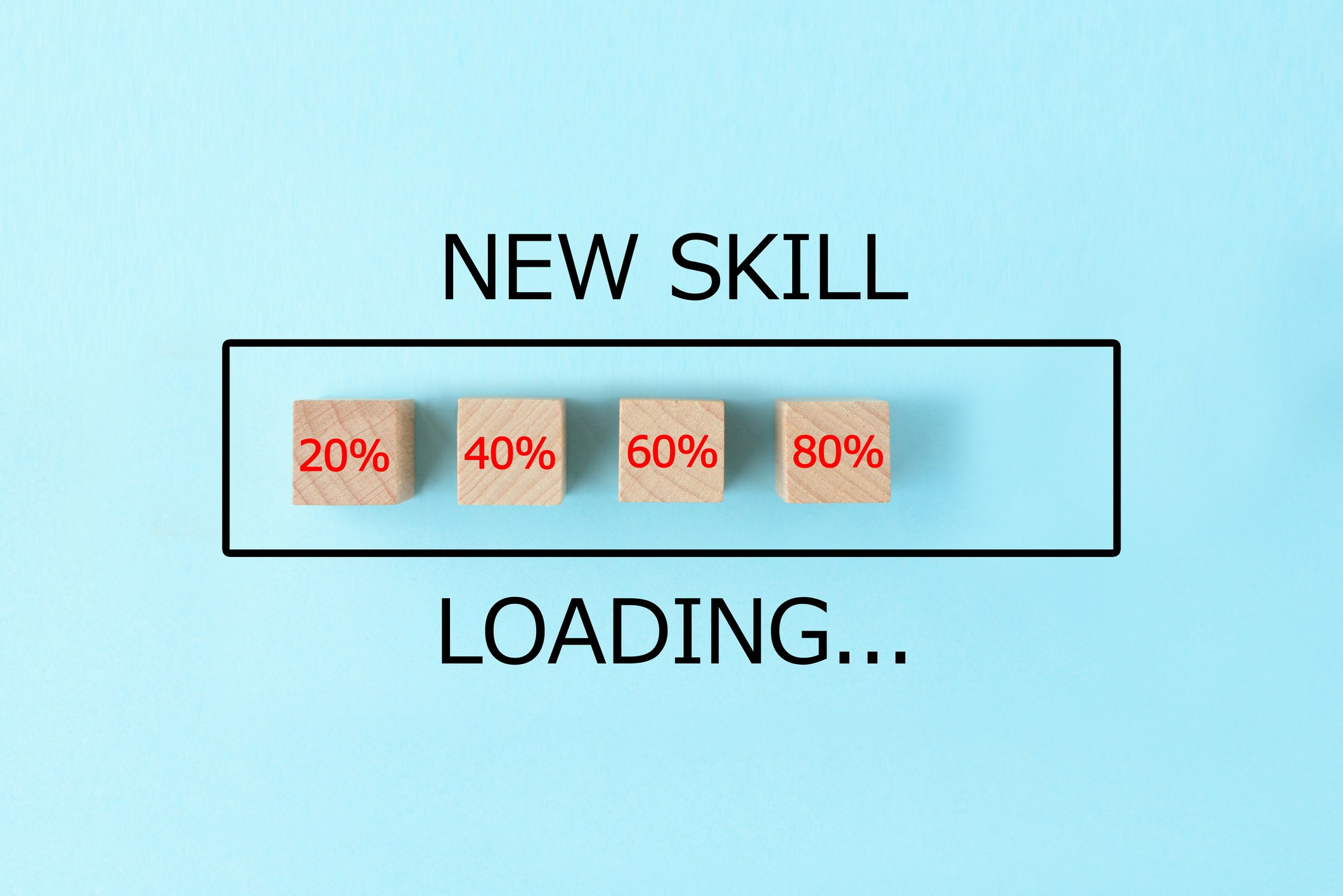What Are the Social-Emotional Skills Used in Dungeons and Dragons?
Hi! I’m Katie Lear, and I’m a therapist who loves D&D. If you’ve taken a look at our website before, you’ll know that we’re all about using Dungeons and Dragons as a way to help kids and teens hone their social-emotional skills, sometimes referred to as SEL skills.
The collaborative, immersive nature of D&D makes it an amazing vehicle for social and emotional learning. You’re literally putting yourself in another person (or elf, or gnome, or giant talking cat’s) shoes. How you interact with others has a huge influence on the success or failure of your game. You almost can’t help but improve your people skills!
But what exactly are social-emotional skills, and how do they get used in the game? Therapists are sometimes guilty of dropping buzzwords like “SEL skills” without really unpacking what they mean. So today, let’s get into it! We’re going on a deep dive into the social-emotional skills we see kids use over the course of a standard D&D campaign. You’ll learn what SEL skills are, why they’re important, and how they play out in D&D.
What Are SEL Skills, and Why Do They Matter?
SEL stands for “Social-Emotional Learning.” SEL skills refer to all of the abilities that we use in daily life in order to understand ourselves and other people. They help us to identify and manage our own emotions, and also help us know what to do in order to have good relationships with others.
The Collaborative on Academic and Social Emotional Learning, often called CASEL, divides social-emotional skills into 5 main categories:
Self-awareness skills such as identifying feelings, knowing your values, and having a growth mindset.
Self-management skills such as goal setting and planning, self-motivation, managing strong emotions, and taking initiative.
Responsible decision-making skills such as creative problem-solving, using facts to guide decisions, and considering possible consequences for a given action.
Relationship skills such as healthy conflict resolution, leading groups, and resisting negative peer pressure.
Social awareness skills such as empathy, compassion, perspective-taking, and appreciating people from different cultures and backgrounds
If you’ve ever heard someone talk about “soft skills” or “people skills,” there’s a lot of overlap between these ideas. They aren’t traditionally academic subjects: you’ll probably never find a textbook on empathy in your child’s backpack or hear about a pop quiz in conflict resolution. And yet, these skills are crucial to having a happy adult life! They help children excel as students, develop healthy friendships, cope with their own emotions, and become leaders in their future careers.
Being stuck at home for several years during the pandemic has not done kids any favors when it comes to developing SEL skills. Teachers have noticed a deficit in social skills among young children entering their classrooms. Social-emotional skills are helpful for everybody, but this generation of kids could benefit from extra opportunities to practice, since they’re making up for lost time.
Now that we’ve made the case for these skills, let’s talk about how D&D can help kids to build them!
Dungeons & Dragons Encourages Communication Skills
Roleplaying games like D&D are unique in that they require players to verbalize everything that they want to do. Unlike a video game, there’s no animation to help you visualize what’s happening. And, unlike a board game, you’re not simply moving pieces along a path. You almost can’t help but become a better communicator if you play enough D&D.
Because you have to describe each action you take, D&D encourages clear, effective communication. You want to make sure that your Dungeon Master, who’s leading the game, knows exactly what it is you’re trying to do! Specificity is really important: where exactly do you want to hit that dragon?
Roleplaying also provides opportunities to flex your public speaking and performance skills. You’re not just getting information across: you’re also setting the scene for your adventure! The tone, pitch, rhythm, and volume of your speech all matter, and will vary depending on what character you’re playing. If you’re the one running a game for your friends, you’ll find yourself really building these skills as you perform a cast of supporting characters for the story.
Even though talking is a big part of the game, nonverbal communication is equally important. As a D&D player, you’re constantly trying to figure out the motivations of your fellow characters. Was that shopkeeper really being honest with you when he said he didn’t see anything suspicious last night? When your party’s wizard said they thought your plan was amazing, were they being genuine or sarcastic? If you’re trying to convince the town that your character is an expert healer, what kind of body language should you use? These little nuances matter a lot.
Finally, active listening is key to being a good D&D player. Your entire party works together as a team, and you’re not going to get very far if all the players are just sitting around waiting for their next turn to talk. What you do on your turn has to be informed by what the person before you just did. Additionally, so much of D&D depends on the interpersonal relationships you have with other characters. You’re always trying to convince, intimidate, befriend, or negotiate with someone. And in order to do any of those things well, you need to understand not just the words a person is saying, but the feelings behind them.
Teamwork (and Negotiation and Conflict Resolution) Make the Dream Work
Anybody who’s played D&D before is familiar with this age-old warning: never split the party. Dungeons and Dragons is a collaborative game, not a competitive one. All the players are working together toward a common goal, and each character has their own unique strengths and weaknesses to contribute to the common cause. Your group—called a party—is always strongest when it’s together. If people go their separate ways and do their own thing, somebody could get caught unawares by a trap or a monster, without enough brains or strength to escape unharmed.
Heck, even your DM, who is in charge of creating all those traps and monsters, is really on your side. In the end, everyone shares the same goal: to tell a good story and have fun. This means that cooperation and teamwork are essential to your success. You know that old saying that if you want to go fast, go alone, but if you want to go far, go together? That totally applies to D&D. You can’t “win” the game unless everyone wins with you, so you’d better find a way to work together.
In D&D, the dungeon master presents a scenario to the group, who must then decide how their characters would like to respond to the situation. Sometimes, you get to make these decisions by yourself: if you’re about to deal the killing blow to an ogre, you get to describe that epic glory all by yourself! However, many choices in D&D rely on shared decision-making. Should we go on this intriguing side quest to rescue the nobleman’s jewels, or stay focused on the task at hand? Should we take a left turn into the forest, or a right turn across this meadow? Do we want to continue this fight, or run away?
Whenever you’re confronted with a dilemma like the ones above, your group will have to reach a consensus in order to move forward. You’ve got to be willing to make your case, and then negotiate if needed to reach a compromise that works for everybody. Maybe your party agrees to complete their main quest, and then return to find the nobleman’s jewels once they’ve retrieved the mythical magic item they’re looking for.
Earlier, I mentioned that every D&D character is unique, bringing their own strengths and weaknesses to the table. Because of that, working well as a team means acknowledging that you might not always be the right person for the job. D&D players learn to appreciate and value each other’s strengths, both as fictional characters and as real people.
As much as you’d like to be the one to charm the jailer into letting your party escape, you know that you have an ultra-charismatic Bard who is more up to the task. And maybe you learn that one of your players is an incredible roleplayer, so you make sure to give her a chance to deliver a dramatic speech before you charge into battle. In a good D&D game, everybody gets a chance to be in the spotlight, so it’s a little easier to make sure others get their turn, too.
Dungeons and Dragons Develops Emotional Intelligence
At first glance, D&D may seem like a game that’s all about stats, dice rolls, and gathering loot. And you can definitely play that way, if you want to! But for many people, all the stats and numbers of D&D are just a way to add structure to a game that’s really about emotional exploration. There are nearly endless opportunities in D&D to develop emotional intelligence.
Kids need to see characters in stories who resemble theselves in order to develop a healthy identity. They also need exposure to charcters who aren’t like them, to provide a glimpse into different cultures and ways of living. D&D can provide both of these experiences for players. In D&D, you can be anybody: old or young, male or female, powerful or vulnerable. It’s a chance to test drive characteristics you wish you had more of in real life, or to just try out being someone completely different. Through roleplay, you get to imagine what it might feel like to be this person you’ve created, and think about how they’d respond to the situation at hand. Players walk away from the table with increased capacity for empathy and perspective-taking, and maybe deeper self-awareness, too.
Finally, D&D is a great way practice emotion regulation in a low-stakes environment. The game is fun, but it can also be stressful, frustrating, and disappointing! Because there’s an element of chance to the game, success is never guaranteed. You can come up with the most amazing plan, only to watch it fall apart due to a bad dice roll. Playing with a team can also make things complicated: someone else’s mistake could make your idea backfire, too. With each roll of the dice, you get a small chance to practice tolerating frustration and bad outcomes and making the best of them. Over time, you’ll probably discover there’s a silver lining to these failures: they often make the best storytelling moments. Over time, this growth mindset can make it easier to handle “real life” challenges as well.
Planning and Problem Solving Are Social-Emotional Skills, Too!
Your adventuring party approaches a mysterious cave. Villagers have warned you that strange visions tend to appear to those who come to these woods in search of treasure—could this be one of them? It’s too dark too see inside, but from somewhere deep within you hear what sounds like faint music. You are tempted to rush right in—but wait! You’d better come up with a plan first.
Even though skills like planning, problem solving, and impulse control aren’t super touchy-feely, they still count as social-emotional skills and there are ample opportunities to practice them in D&D. The decisions your character make have a direct impact on the direction the story goes, which means every action you take is a mini-lesson in cause and effect.
Lots of your time spent playing D&D gets devoted to hatching a good plan. The DM presents you with a quest—recover the stolen treasure from a sleeping dragon inside the cave—and it’s up to you to figure out how to accomplish the task. Usually, these problems are open-ended: there are many possible ways to achieve your goal. Since there’s no “right” answer, it helps to think outside the box: creative problem-solving skills are extremely helpful here. Sure, you could just tiptoe in and try to quietly drag the treasure chest away. But you could also disguise your party’s halfling as a baby dragon, or turn your whole party invisible, or try to dig a tunnel to get into the cave another way.
You can never know for sure how other characters in the game will react, and a low dice roll can quickly turn an easy task into a hard one. This means that during the planning process, you’ll need to think analytically and evaluate possible consequences of your actions before choosing an idea. I’m sure every D&D player can think of a time when they skipped this step and rushed into a situation without, say, investigating the area or asking their friends for help. You might occasinoally get lucky with this approach, but more often you’ll find yourself falling into a trap or facing an enemy you hadn’t expected. After a few of these bad experiences, it gets easier to practice impulse control and think before you act.
Alas, you can go through all these steps, and come up with the world’s most creative, logical, responsible plan…and it could still not work. Maybe your monster is immune to the kind of damage you tried to use. Or perhaps the odds were simply not in your favor. After practicing those emotion regulation skills mentioned above to deal with frustration, failed plans are an opportunity to build resilience. If at first you don’t succeed…try, try, again. Unless the dragon ate your entire party, you usually get opportunities to adapt your plan. You can make decisions based on data you gathered from your failed attempt, and think flexibly to come up with an alternative solution.
A foiled plan can be annoying, but think of how satisfying it will be when you finally get that treasure. Overcoming obstacles as a team is one of the most rewarding parts of the game, especially when you’ve worked really hard to earn that victory.
In Conclusion: Social-Emotional Skills Are Everywhere
This is far from a definitive list of every social-emotional skill used in D&D. We haven’t even touched on the friendship-building aspects of the game! Hopefully, though, it’s given you an idea of the many complex processes that occur behind the scenes when kids participate in a roleplaying game. Young people learn best through play, and imaginative games like D&D offer almost limitless possibilities to practice skills, challenge old thinking patterns, and dream up new possibilities.
Let’s wrap up by summarizing all the social-emotional skills covered in today’s post. Through D&D, kids can practice:
Effective communication
Public speaking
Nonverbal communication
Active listening
Cooperation and teamwork
Shared decision-making
Compromising to reach a consensus
Negotiation
Appreciation for others’ strengths
Empathy
Perspective-taking
Self-awareness
Emotion regulation
Growth mindset
Creative problem-solving
Analytical thinking
Anticipating and evaluating possible consequences
Impulse control
Resilience
Adaptation and flexible thinking
Data-driven decision making
Overcoming obstacles as a team
The hope is that with time and practice, kids are able to generalize these skills. That means they can begin to use all these new social-emotional capabilities in settings outside of D&D. What started out as a tool for telling a make-believe story eventually becomes a habit that carries over into school, friendships, and family life.
Learn to Use Social-Emotional Skills Through D&D With Us!
If D&D with a social-emotional bent sounds like it could be your child’s jam, we’d love to have them join us at Young Dragonslayers™. We’re an online gaming company that uses D&D to help tweens and teens ages 11-16 learn SEL skills through gaming. We keep our group sizes small so that everyone gets plenty of chances to speak, and match players based on age and interest level to create a supportive environment where it feels safe to learn.
Our inclusive, affirming games are open to players of all genders and experience levels. Because we meet over Zoom or Discord, we’re available to players anywhere, although we’re most convenient for folks in the Eastern, Central, Mountain, or Pacific time zones.
Our groups run in 10 week cycles, and the best way to get started is to fill out an application for our mailing list. We’ll let you know about upcoming trial classes, and make sure you’re the first to know when we open for enrollment for our weekly games.





